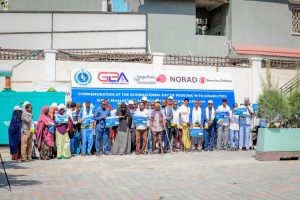Mogadishu 27/7/2017: Mohamed Ali Farah, the chairman of Somali Disability Empowerment Network (SODEN) met with the deputy special representative of the UN Secretary-general for Somalia Mr Peter de Clercq. This meeting is a follow-up to another previous meeting they had in London conference. Mohamed Farah gave a full explanation about the issue of disabled people in Somalia including those who have mental health illnesses, during the conference, Mohamed also talked about how UN office Somalia can improve the rights of disabled people in Somalia and told him that UN agencies and international organizations who are working Somalia and their humanitarian response is not inclusive, also SODEN director emphasized the need the UN to ensure the rights of disabled people in Somalia.

After exchanging their ideas, The UN deputy special representative, Mr. Peter de Clercq suggested together with Mohamed to hold a big event to which all humanitarian organizations either UN agencies or international NGOs will be invited together with civil societies and federal government of Somalia to address the issue of disabled people in Somalia and to give more attention and build an environment in which disabled people can be benefited and create Disability inclusive humanitarian response.
A person with disabilities in Somalia as in many other countries, face numerous challenges that result in their exclusion from the mainstream of society, making it difficult for them to access their fundamental social political and economic rights. Many make their way through life impoverished, abandoned, uneducated, malnourished, discriminated against, neglected and vulnerable for them, life is a daily struggle to survive. Whether they live in urban centres or in rural areas, they share those common problems. They are largely excluded from essential services and lack protection of the family and community, and often at risk of exploitation and abuses. Factors contributing to this pathetic situation are many and varied but include poverty, unemployment social isolation, and environmental institutional attitudinal and economic barriers.





